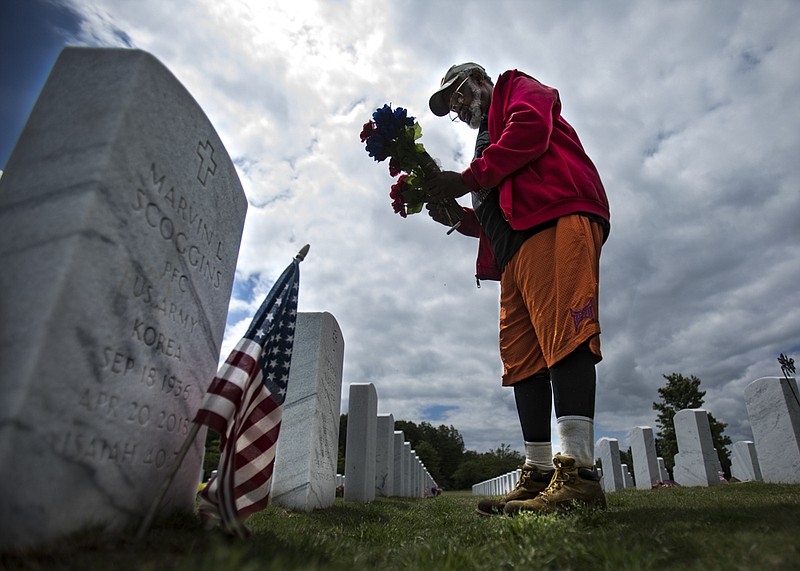"Our flag does not fly because the wind moves it.
It flies with the last breath of each soldier who died protecting it."
- Unknown
Memorial Day and the occasional honors we give our fallen soldiers throughout the rest of the year are seemingly the only honorable things about war.
War is, after all, the end result of our inability to live peacefully and fairly with each other.
Even George S. Patton said, "It is foolish and wrong to mourn the men who died. Rather we should thank God such men lived."
And Archibald MacLeish puts it another way: The dead soldiers "have a silence that speaks for them at night ... They say, Our deaths are not ours: They are yours. ... "
Yet, every last Monday of May in each year, we do honor these dead heroes - more than 1.3 million of them, the American men and women who died serving our country in various wars. Would that we could honor them instead by still being able to talk to them, hug them, feed them.
This year, the silence of those dead soldiers interred in Chattanooga National Cemetery - where death curls row after row and knee-deep across gentle hillsides stabbed with more than 50,000 tombstones - will echo louder than ever. The new coronavirus pandemic has silenced the usual public tributes. This year, not even the flutter of small flags, usually placed on each grave by area Scout troops, will break the quiet.
The ceremonies for our local war dead and for the veterans who died later still carrying the mental and physical scars of war were put on hold in this time of social distancing as our local cases of COVID-19 continue to rise. Nationally, the 93,000-plus coronavirus deaths rival the numbers of American soldiers killed in the Korean and Vietnam wars combined.
Historians tell us that the original date of every Memorial Day was May 30. That was the date suggested in 1868 by Union Gen. John A. Logan when he called for a first official nationwide day for remembrance. He chose that date because it wasn't the anniversary of a particular battle.
Tallying our war dead
› 4,435 died in the Revolutionary War› 2,260 died in the War of 1812› 13,283 died in the Mexican War› 364,511 died in the Civil War› 2,446 died in the Spanish-American War› 116,516 died in World War I› 405,399 died in World War II› 36,574 died in the Korean War› 58,220 died in the Vietnam War› 2,586* died in the Persian Gulf War› 2,219* died in Operation Enduring Freedom› 4,418* died in Operation Iraqi Freedom› 74* died in Operation New Dawn› 95* died in Operation Inherent Resolve› 90* died in Operation Freedom’s Sentinel*As of March and May, 2020Sources: Congressional Research Service, U.S. Department of Defense
In reality, one of the first Memorial Day celebrations occurred three years earlier on May 1, 1865, in Charleston, South Carolina.
That was the day when newly freed slaves, members of the U.S. Colored Troops, and some local white missionaries organized a ceremony to bury Union troops who died in horrendous conditions in a prison created at what was once a racetrack there. They honored the dead by singing hymns and placing flowers on their graves. An archway over the cemetery was engraved with the words "Martyrs of the Race Course."
Historian and Yale professor David W. Blight stumbled on the real story when looking through two boxes of unsorted material from Union veterans held in Harvard's Houghton Library. The story from those documents became the main message in his 2001 award-winning book, "Race and Reunion."
In 1950, Congress passed a resolution to observe Memorial Day as a day of prayer for permanent peace, and in 1968 passed the Uniform Monday Holiday Act, placing Memorial Day on the last Monday in May to create a three-day weekend for federal employees. The day became an official federal holiday in 1971.
Last week, coronavirus continued to ravage the planet, and the World Bank estimated that 60 million people could fall into extreme poverty. It's the stuff of which fighting wars are made.
In the meantime, President Trump's "maximum pressure" on Iran has backfired, Europe is abandoning the U.S. on the world stage and turning toward what it perceives as a more stable country - China. This comes just as China and America edge toward a new cold war. On our Southern border, we're no longer caging migrant children; now we're deporting them - alone and sometimes without their parents' knowledge.
None of this is any way to honor our war dead. They died for peace - not fear and anger.
If they could, they would remind us that heroism doesn't have to happen in a volley of gunfire. More often it happens in small ways when big hearts change the course of history.
We believe we honor the dead best by treating the living well.
